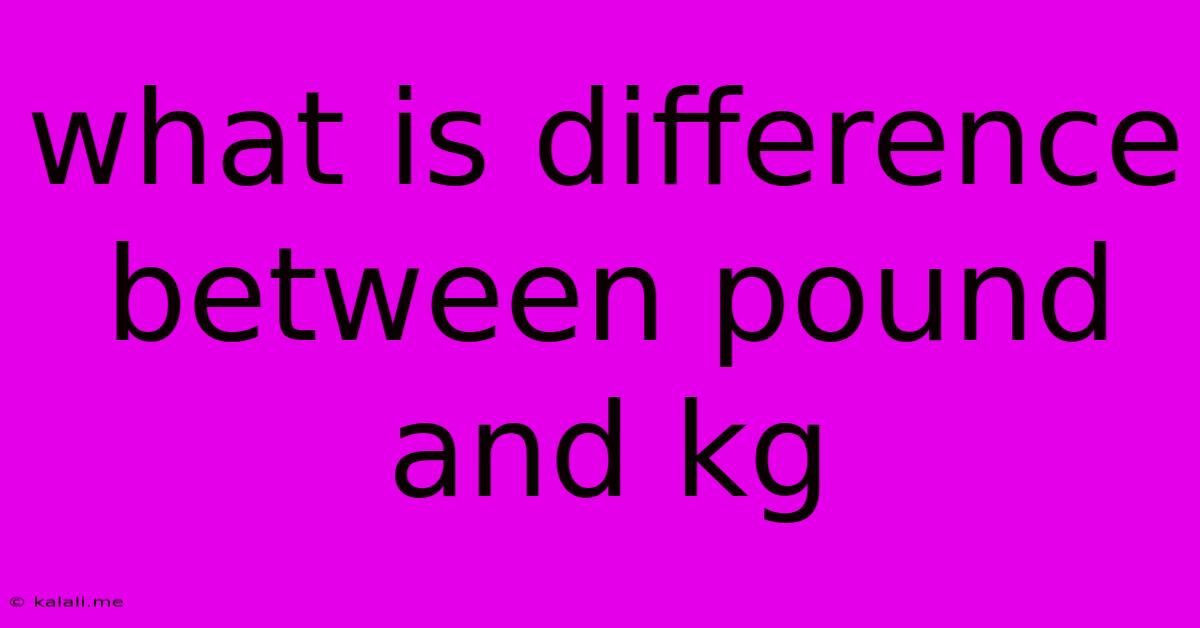What Is Difference Between Pound And Kg
Kalali
Jun 14, 2025 · 3 min read

Table of Contents
What's the Difference Between Pounds and Kilograms? A Simple Guide
Understanding the difference between pounds and kilograms is crucial for accurate measurements, especially in cooking, shipping, and various scientific fields. This guide will clarify the distinction between these two common units of mass (or weight, in everyday usage). It's a seemingly simple question, but understanding the conversion and the historical context adds depth.
Pounds (lbs): The pound is a unit of mass in the imperial system of measurement, commonly used in the United States and a few other countries. It's a historical unit, with its origins tracing back centuries. The pound is often abbreviated as "lb" (from the Latin libra pondo). While technically measuring mass, in everyday conversation, it's often used interchangeably with weight.
Kilograms (kg): The kilogram is the base unit of mass in the International System of Units (SI), also known as the metric system. It's globally recognized and used in most of the world. The kilogram is abbreviated as "kg." Like the pound, it's technically a measure of mass, but in casual use, it’s often treated as a measure of weight.
Key Differences Summarized:
- System: Pounds belong to the imperial system, while kilograms are part of the metric system.
- Scale: Kilograms are larger units than pounds. One kilogram is approximately equal to 2.20462 pounds.
- Global Usage: Kilograms are far more widely used internationally than pounds.
- Scientific Preference: The metric system, and thus the kilogram, is preferred in scientific and technical fields for its consistent decimal system.
Converting Between Pounds and Kilograms:
The conversion is straightforward:
- Pounds to Kilograms: Divide the number of pounds by 2.20462.
- Kilograms to Pounds: Multiply the number of kilograms by 2.20462.
For quick estimations, you can use the approximation of 1 kg ≈ 2.2 lbs.
Historical Context:
The pound's origins are ancient, evolving over time with different standards across regions. The kilogram, on the other hand, is a more recent and internationally standardized unit, defined based on a physical prototype. This standardization contributes significantly to its widespread adoption and use in scientific measurements.
Practical Examples:
- Cooking: Recipes may use either pounds or kilograms for ingredients. Knowing the conversion is vital for accurate results.
- Shipping: Shipping companies often use kilograms for calculating freight charges, especially in international shipments.
- Healthcare: While pounds might be used in some contexts, kilograms are generally preferred for body mass measurements in medicine and healthcare.
Choosing the Right Unit:
The best unit to use depends on the context. In international contexts or scientific work, kilograms are almost always the preferred choice. In the United States, both pounds and kilograms are used, but the trend is towards increasing adoption of the metric system. Understanding both systems and how to convert between them will enhance your understanding and efficiency in various situations.
In conclusion, while both pounds and kilograms measure mass (weight in everyday language), they belong to different measurement systems and have different scales. Understanding the difference and how to convert between them is essential for anyone working with measurements in various fields.
Latest Posts
Latest Posts
-
Which Of The Following Secrete Hydrochloric Acid
Jun 14, 2025
-
The Total Number Of Lobes In Both Lungs Is
Jun 14, 2025
-
Which Of The Following Is Not Associated With Animal Cells
Jun 14, 2025
-
What Are The Prime Factors Of 14
Jun 14, 2025
-
What Is The First Step In Respiration
Jun 14, 2025
Related Post
Thank you for visiting our website which covers about What Is Difference Between Pound And Kg . We hope the information provided has been useful to you. Feel free to contact us if you have any questions or need further assistance. See you next time and don't miss to bookmark.